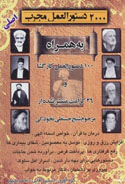Which Quranic verses imply divine appointment of Imam?
Question
Which Quranic verses imply divine appointment of Imam?
Answer
Referring and reflecting on the Quranic verses, we find that Imamate and governance is in hands of God, and He may confer it to whomever He may deem appropriate. Here, we will refer to some verses in this regard.
First verse
The Almighty God says:
وَإِذِ ابْتَلى إِبْراهِیمَ رَبُّهُ بِکَلِمات فَأَتَمَّهُنَّ قالَ إِنِّی جاعِلُکَ لِلنّاسِ إِماماً قالَ وَمِنْ ذُرِّیَّتِی قالَ لا یَنالُ عَهْدِی الظّالِمِین
And when his Lord tried Abraham with certain words, which he fulfilled them. He said: Surely I will make you an Imam of people. Abraham said: And of my offspring? My covenant does not include the unjust, said He.[1]
It is inferred from several phrases in this verse that Imamate is a divine position, and an Imam shall be appointed by God’s permission and will:
a- In the phrase
إِنِّی جاعِلُکَ لِلنّاسِ إِمام
)Surely I will make you an Imam of people), God has attributed appointment of Imam to Himself. Therefore, Imam shall be appointed by God.
b- The phrase, عَهْدِی, (My covenant) has been applied for Imamate, implying that it is a divine covenant concluded between God and an immaculate individual.
Second verse
Moses (a.s.) requests God to appoint his brother, Aaron, as his minister and successor. God narrates from Him:
قالَ رَبِّ اشْرَحْ لِی صَدْرِی * وَیَسِّرْ لِی أَمْرِی * وَاحْلُلْ عُقْدَةً مِنْ لِسانِی * یَفْقَهُوا قَوْلِی * وَاجْعَلْ لِی وَزِیراً مِنْ أَهْلِی * هارُونَ أَخِي... ز
(Moses) said: O my Lord! Expand my breast for me; And ease my task for me; And loose the knot from my tongue; (That) they may understand my word; And give me a minister from my family, Aaron, my brother.[2]
The Almighty God did not reply Moses (a.s.) that you shall refer to the people’s votes for selection of your deputy. Rather, He said:
قَدْ أُوتِیتَ سُؤْلَکَ یا مُوسى
(He) said: Granted is your request, O Moses![3]
Third verse
The Almighty God addressed David (a.s.):
یا داوُدُ إِنّا جَعَلْناکَ خَلِیفَةً فِی الاَْرْضِ فَاحْکُمْ بَیْنَ النّاسِ بِالْحَقِّ
O David! We did indeed make thee a vicegerent on earth: so judge among people with justice.[4]
In this verse too, God has attributed appointment of caliphate to Himself, and as a result of this appointment, He commands him to judge among people with justice.
Fourth verse
He also says:
وَجَعَلْناهُمْ أَئِمَّةً یَهْدُونَ بِأَمْرِن
And We made them leaders (Imams), guiding (men) by Our Command.[5]
In this verse too, God has attributed appointment of Imamate to Himself.
One may question that the same phrase has been applied for Imams to aberration where God says:
وَجَعَلْناهُمْ أَئِمَّةً یَدْعُونَ إِلَى النّارِ
And we made them (but) leaders (Imams) inviting to the Fire.[6]
We reply:
First: we have already proved that there is no compulsion, and God has never appointed anyone on his behalf for aberration of people. Rather, some people select aberration voluntarily, and lead the others to aberration.
Second: this is one of the equivocal verses, and shall be interpreted based on the clear verses of Quran. However, we can interpret it based on the verse
یُضِلُّ مَنْ یَشاءُ وَیَهْدِی مَنْ یَشاءُ
That is to say, God leaves alone some people as a result of their disobedience and rebellion, and therefore, they will proceed far in aberration, and invite the others to the hell.
Third: Appointment of Imams of aberration may imply confrontation, as God has ascribed trick to Himself for confrontation.
وَمَکَرُوا مَکْراً وَمَکَرْنا مَکْراً
Fourth: For Imams to truth, God has applied the term, یَهْدُون (leading), but for Imams to aberration, the term “inviting” has been applied
یَدْعُونَ إِلَى النّارِ
There is a clear difference between these two terms.
Fifth: For Imams to truth, their guidance is by Divine Command
یَهْدُونَ بِأَمْرِن
, but such phrase has not been applied for Imams of aberration.[7]
1-The Cow:124
2-Ta Ha:25-30
3-Ta Ha:36
4-Sad:26
5-Prophets:73
6-Stories:41
7- Ali Asghar Rezvani, Imamology and reply to the questions (1), page 75
مطالب مشابه با این موضوع:
وبگــــــــــردی طلبۀ پاسخگو
- فایل اعمال و رفتار های خلاف قانون جناب آقای حسن روحانی
- در کنج خانه طلبهها چه میگذرد؟
- سکوت چند ساله مسئولان حوزه در قبال حملات وحشیانه به طلاب!
- می گویند که مملکت مملکت آخوندهاست!!
- یک ماجرای تلخ که خانم ها با تأمل بیشتر بخونند
- جریان های تکفیری موجود در عراق و نحوه شکل گیری آنها
- سیر تکاملی تفکر سلفیه چگونه بوده است؟
- بداء در قرآن و حدیث چگونه مطرح شده است؟
- پیامبر (ص) با مخالفین خود چگونه بر خورد می کرد؟
- سبک زندگی حضرت زهرا سلام الله علیها
- ملاک کرامت و شرافت افراد، انسانیت است یا جنسیت؟
- رنگ و پوشش های رنگی در اسلام
- حجاب، زنان را افسرده میکند و مانع پیشرفت اجتماعی آنهاست!!!
- علوم لدنی معصومین
- مگر ولی فقیه معصوم است که ولایت مطلقه دارد؟
- اگر خدا ازعاقبت ما اطلاع دارد قیامت برای چیست؟
- آیا بجای نماز خوندن، پیانو یا سه تار بزنم؟
- چرا مراسم عزاداري امام حسين(ع) پيش از شهادت ايشان صورت ميگيرد؟
- چرا امام حسين(ع) در كربلا براي رفع تشنگي از خداوند طلب باران نكرد؟
دانــــــلود های مفیـــــــــــــــــــد
- دانلود پاورپوینت شناخت وهابیت و صهیونیسم و ارتباط با همدیگر
- دانلود دو پاورپوینت اجرای عید غدیر خم
- دانلود پاورپوینت احتجاج اميرمؤمنان (ع) به غدير
- پژوهشی در کلام و پیام مقام معظم رهبری پیرامون ماه رمضان
- خطبه شعبانیه و خطبه امیرالمومنین(علیه السلام) پیرامون روزه و ماه رمضان
- دانلود پاورپوینت و pdf تفاوت های زن و مرد
- دانلود جزوه ساعات سعد و نحس(زمان نوشتن دعا)
- تقویم مذهبی شمیم یار 96 مخصوص کامپیوتر
- دانلود نرم افزار «شیعه شناسی»
- دانلود پاورپوینت ساختار خانواده و مسایل آن
- دانلود کتاب دایره المعارف جنسی
- دانلود نکات جذاب دوران عقد
- دانلود کتاب درمان سرد مزاجی و بی میلی جنسی بانوان
- دانلود کتاب حسادت کودکان
- دانلود کتاب درمان خستگی وناتوانی جنسی
- دانلود پاور پوینت اسیب های ازدواج وخانواده
- دانلود پاورپوینت هشت گام برای تحقق رویا به واقعیت
- دانلود پاورپوینت تقویت اراده
- دانلود پاورپوینت موفقیت وروشهای رسیدن به ان
- دانلود پاورپوینت هنر رفتار با افراد دشوار
- دانلود پاورپوینت جملات جالب وجذاب روحیه بخش بزرگان
- دانلود پاورپوینت راههای مقابله ودرمان استرس
- دانلود پاورپوینت نیازهای اساسی کودکان
منبــــرهای مکــــــــــــــــــتوب
- منبر مکتوب: روز عرفه و فرصت ها
- منبر مکتوب: سبک زندگی امام باقر علیه السلام
- منبر مکتوب: سه نیاز مومن (امام جواد علیه السلام)
- سخنرانی سلسله ای و چند جلسه ای مناسبت ماه رمضان
- دانلود 30 جلسه سخنرانی ماه مبارک با موضوع تنها مسیر
- موضوعات پیشنهادی سخنرانی برای محرم
- فضائل حضرت قمر بنی هاشم علیه السلام
- برکات وجود ابا عبدالله علیه السلام بر عالم
- بررسی بُعد اخلاقی،عبادی و عرفانی عاشورا
- آخرين وصيت امام حسين عليه السلام
- اولین علت رویاروی در کربلا؛ دوری از یاد خدا
- هميشه حزن؟ شادي چرا نه؟ - شب دهم محرم
- چرا نفرين ؟ - شب نهم محرم
- نماز ظهر عاشورا - شب هشتم محرم
- فلسفه عزاداری - شب هفتم محرم
- دفاع از دین - شب ششم محرم
- فلسفه حضور خانواده سيد الشهداء - شب پنجم محرم
- علم امام علیه السلام به شهادت - شب چهارم محرم
- فقدان شرایط امر به معروف و نهی از منکر- شب سوم محرم
مناظرات طلبه پاسخگو
جدیدترین های زبان انگلیسی
- Islam and Its Social System
- Duties of Man Towards the People
- Islam Various Systems
- Attributes of The Real Follower of Imams in Their Teachings
- Who is a Real Shia Muslim?
- RIGHTS OF SCHOLARS
- Islam Attacks Slavery 1
- The Advantages of Religion 2
- The Clearest Reason for Free Will
- Sheikh Zakzaky to be released on bail
- Brief History of Religions
- Is It Necessary For Man To Follow A Religion?
- The Advantages of Religion 1
- Who Is Almighty Allah?
- What are the differences between Shia and Sunni Muslims؟
- The Rights Islam Offers to Women
- How I find that Islam does not Oppress Women?
- URGENT MEDICAL TREATMENT FOR SHEIKH ZAKZAKY
- The motto of this year’s book fair is “Reading Is Ability”.
- Fundamental principles of Islam
بیشترین دانلود ها
- دانلود صوتي تکنیک های نزدیکی زن و شوهر (108062)
- دانلود رایگان کتاب خواص سوره های قرآن (54777)
- دانلود پاورپوینت بسیار مفید مهارت های زندگی (37434)
- دانلود پاورپوینت و pdf تفاوت های زن و مرد (33809)
- دانلود كتاب مسائل جنسي و زناشوئي در احاديث (33767)
- دانلود کتاب دایره المعارف جنسی (31828)
- دانلود پاورپوینت های آموزش پیش از ازدواج (30508)
- دانلود بسیار مفید پاورپوینت آئین همسرداری (29883)
- دانلود پاورپوینت آموزشی بررسی رابطه دختر و پسر (29536)
- دانلود 110جلد کتاب بحارالانوار علامه مجلسی ره (29484)
- دانلود كتاب دختران خوب به آسمان می روند دختران بد به همه جا (28471)
- دانلود کتاب آموزش جنسی آقایان (28254)
- دانلود كتاب فرق و مذاهب كلامي استاد رباني گلپايگاني (28213)
- دانلود کتاب درمان سرد مزاجی و بی میلی جنسی بانوان (28017)
- دانلود نکات جذاب دوران عقد (27571)
- دانلود نرم افزار «شیعه شناسی» (25864)
- دانلود کتاب درمان خستگی وناتوانی جنسی (25129)
- دانلود پاورپوینت تقویت اراده (23610)
جدیدترین مطالب سایت
- پاسخ به شبهات ولایت (4662) بازدید
- پاسخ به شبهات ولایت (4456) بازدید
- اذان در جامعه اسلامی نماد چیست ؟ و چرا فقط سه بار در روز تکرار می شود ؟ (3883) بازدید
- باتوجه به عادل بودن خداوند چرا بعضی از انسانها را ناقص الخلقه آفریده است ؟ (3962) بازدید
- ویژگی خاص قرآن چیست که کسی نمی تواند مانند آن را بیاورد ؟ (4181) بازدید
- با توجه به ترک خود ارضایی عوارض آن هنوز در من هست چگونه آن را برطرف کنم ؟ (5574) بازدید
- آیا بدن اخروی مانند بدن مادی است ؟چهره ی واقعی انسان در قیامت چگونه است ؟ (4976) بازدید
- آیا ادعای ملاقات امام زمان (عج) از جانب برخی افراد صحت دارد ؟ (4474) بازدید
- چرا به اصول و قواعد دین اسلام توجه نمی شود و پذیرش آن از سوی پیروان ادیان دیگر سخت است ؟ (4845) بازدید
- فلسفه وجود لباس روحانیت در عصر حاضر چیست ؟ (3525) بازدید
- آیا وظیفه یک روحانی تنها راهنمایی مردم و فعالیت و تدریس در حوزه هاست ؟ (2933) بازدید
- آیا نظریه تناسخ از دیدگاه اسلام پذیرفته شده است ؟ (5197) بازدید
- آیا توصیف بهشت و جهنم در قرآن تمثیل هایی برای درک بهتر آن جهان است ؟ (4812) بازدید
- با توجه به اینکه اسلام کاملترین دین هست چرا ما نسبت به کشور های غیر مسلمان عقب مانده تر هستیم ؟ (6698) بازدید
- نقش امام و رهبر در جامعه اسلامی چیست ؟ و اگر نباشد چه اتفاقی می افتد ؟ (4522) بازدید
پربازدیدترین های سایت
- زنی هستم که میخواهم به شوهرم خیانت کنم!!! (605276)
- آيا زن شوهر دار بخاطر رفع نیاز جنسی اش ميتواند صیغه شود؟ (500981)
- دوست دخترم حامله شده چکار کنم؟ (398571)
- میل جنسی زیادی دارم و به شدت داره منو عذاب می ده (340491)
- دیدن فیلم های مبتذل زن و شوهر برای تحریک شدن جنسی (217808)
- چگونه همسرمان را آماده آميزش جنسي كنم؟+18 (213114)
- حکم شرعی نزدیکی از پشت! (208030)
- خانم هایی که می خواهند طلبه شوند بخوانند!!! (205462)
- زنم رابطه جنسی برقرار نمیکند!!! (199658)
- از تجربه های تلخ و تکان دهنده دختران بخوانید شاید... (172388)
- گناه با محارم خود داشتم! (146304)
- رابطه جنسی دهانی حكم چيست؟ (130711)
- محرمات و مکروهات و مستحبات حائض+حکم ورد به امکان مقدسه (129486)
- به رابطه خانمم با خواهر زاده اش مشکوکم؟ (123112)
- سفارش اسلام در مورد آمیزش صحیح چیست؟ (99043)
- نام كتاب حضرت نوح و حضرت ابراهیم؟ (97036)
- با زنان چشم سبز ازدواج نکنیم؟ (94746)


















